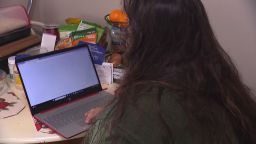Anyone who menstruates will tell you: a period often doesn’t look or feel like the rapturous dancing portrayed in a typical tampon ad.
Taking aim at the sanitized and euphemistic nature of mass advertising aimed at women, personal care brand Frida launched an adult-only online platform Wednesday of tutorial videos showing customers how to use its fertility, prenatal and postpartum products.
The platform, developed alongside health professionals, is in large part a response to many marketing platforms and social media sites taking down or rejecting reproductive and women’s health ads that show more authentic representations of women’s bodies, said Frida founder and CEO Chelsea Hirschhorn.
“You can go on Instagram and learn a 10-step beauty regimen … (but) there’s just no avenue available to brands like ours who make products to help women during these times,” she told CNN. “We show women how to do saline nipple soaks when you have raw or cracked nipples. We show women how to stretch their perineum before labor and delivery to mitigate the risk of tearing, we show them how to properly clean their vagina after vaginal delivery.”
Hirschhorn said she does not expect this explicit content to be shown on social media or television networks given their content guidelines but, since some platforms allow sexualized and suggestive material, “showing female bodies needs to be allowed in non-sexualized circumstances, as well.”
When it comes to more explicit content and nudity, she argues there should be a safe, age-restricted space for this information to be informatively and frankly disseminated to people who need it.
While Frida products have been available in retail stores like CVS, Target and Walmart since 2019, Hirschhorn describes a constant back-and-forth when it comes to fighting for marketing space.
In 2019, ABC declined to air an ad the company had submitted to run during the Academy Awards ceremony that showed a postpartum woman using the restroom. Although the ad contained no nudity, Hirschhorn said ABC told her it does not allow content containing guns, politics, sexual nudity or feminine products. An ABC spokesperson at the time said the network does not comment on its advertising policies and guidelines.
ABC declined to comment. The network’s 2023 guidelines state that “advertising intimate, personal care, contraceptive and fertility products is acceptable on a case-by-case basis. Such advertising should be presented in a sensitive and tasteful manner and will be subject to scheduling restrictions.”
On Amazon, one product intended to relieve breast pain from health issues such as mastitis was flagged as inappropriate because the packaging showed an illustration of a breast, according to Hirschhorn.
And on social media sites like Instagram, ads for Frida products related to fertility and breast health have long been censored and removed.
“In one instance, we had a picture of a woman with one leg in the air holding the at-home insemination syringe, it’s presumably filled with semen. That’s how you use the product. It wasn’t showing any part of her body other than her legs and her hand,” said Hirschhorn.
The ad was rejected by the automatic review system for including the word “fertility,” according to Frida.
Amazon declined to comment. Instagram’s parent company Meta has not responded to CNN’s request for comment.
Amazon’s policy states that “ads must not show fully visible intimate body parts: genitals, female breasts, and buttocks,” but makes exception for partial nudity if it is relevant to the product in question.
Instagram’s community guidelines, which govern the ads it permits, states that no nudity is allowed, but “photos in the context of breastfeeding, birth giving and after-birth moments, health-related situations (for example, post-mastectomy, breast cancer awareness or gender confirmation surgery) or an act of protest are allowed.”
‘Body’ is a four-letter word
Meta has been criticized for years by women’s health experts and advocates for restricting content related to female reproductive health.
“The algorithms as they’re designed right now seem to catch a lot of information about vaginal health and breast health and not allow it,” Jackie Rotman, CEO and founder of the Center for Intimacy Justice, told CNN. “And it’s not just the algorithms, because many of the actual policies written by people at these companies still changes.”
The CIJ, which has partnered with Frida and is supporting the launch of its Frida Uncensored platform, published a report in January 2022 accusing Meta of having biased algorithms, stating that male reproductive health ads were found to be permitted, including ads that referenced male sexual pleasure.
Following the report, Meta tweaked its “adult products or services” advertising policy in October 2022 to include clearer guidelines about reproductive health, clarifying that it allows the promotion of “reproductive health products or services” if the content is targeted to “people aged 18 or older.”
In its adult products and services policy guidelines, Meta (FB) argued that the topic is sensitive, stating that as a global company it needs to take in to account the “wide array of people from different cultures and countries” to “avoid potential negative experiences.”
But the CIJ said that “Meta is still continuing to reject these advertisements in practice.” The CIJ has filed a complaint with the Federal Trade Commission asking it to act on the platform’s content policies, and is currently working on another report investigating alleged discriminatory censorship across other media platforms such as Amazon.
The FTC told CNN it does not discuss communications with external parties unless they are a part of a lawsuit, and does not comment on whether an investigation exists “unless it’s publicly disclosed by the parties.”
“When it comes to access to health information for people who are going through different life experiences, there’s such a dearth of information available. That type of information is already lacking in the doctor’s office, and then they can’t get it online, because they don’t even realize that certain keywords and search terms are hidden from them,” said Rotman. “That’s why the (Frida Uncensored) platform is important. It’s taking a really important stance in this effort and galvanizing more voices and increasing access to important health information.”
Critics also point out that, while content showing sexualized women are typically allowed, ads that address women’s pain or depict a more unglamorous and unvarnished picture of women’s experiences are more likely to be rejected.
“Whether it’s alcohol or underwear or cars, our culture is used to seeing so many examples of ads in which women’s bodies are being sexualized to sell something else,” said Rotman. “But when it’s actually about agency over our own bodies, that information is extremely suppressed.”
Censorship has real health implications
Discussions involving women’s bodily functions and health have long been seen as off-limits, even as women’s pain and other health concerns are more likely to be dismissed by healthcare professionals.
A February 2023 report published by Canada’s Alberta Women’s Health Foundation found that taboos around women’s health issues hurt women by reducing awareness of conditions like menstruation symptoms and loss of bladder control. This, in turn, leads to worse health outcomes, the report found, because women ignore or minimize symptoms until medical intervention is absolutely necessary, which may mean that treatment will be more aggressive.
Ads for bladder control aids and menstruation symptoms, which are often promoted on television and social media, help raise awareness for these conditions and are “fundamental to addressing the health of women,” said Chloe Bird, director of the Center for Health Equity Research at Tufts Medical Center, noting that popular culture and healthcare have made tremendous strides in increasing visibility of women’s health issues over about the last 50 years.
However, she added there is still room for progress when it comes to making information publicly available.
According to Bird, the return on investment when it comes to funding women’s health is tremendous, “but the funding alone can’t do it. The science alone can’t do it.”
“You actually have to be able to disseminate information about women’s health … at a level that can be understood. And if it’s all innuendo, if it’s all abbreviated, then it’s not possible to get a message across,” said Bird, who is also the Sara Murray Jordan Professor of Medicine at Tufts University School of Medicine. “(Censoring this type of content) is an impediment to women having access to technologies that work, to information on how they can improve their health, understanding differences in medications … and all of these things have a huge impact on health-related quality of life and on functioning and wellbeing.
Hirschhorn said her decision to launch the Frida Uncensored platform was also rooted in her experiences navigating her own health throughout puberty, such as figuring out how to place a tampon correctly for the first time.
Bird says that, after people begin talking openly about certain topics, there’s a cultural lag as rules around social norms and practices shift.
“You’re seeing that kind of decision-making around the advertisements being on social media, but in the general public, we talk about women’s bodies and women’s lives,” said Bird.
“Maybe we need more women in the room (at these companies) making the decision.”
CNN’s Jessie Gretener contributed to this report.




